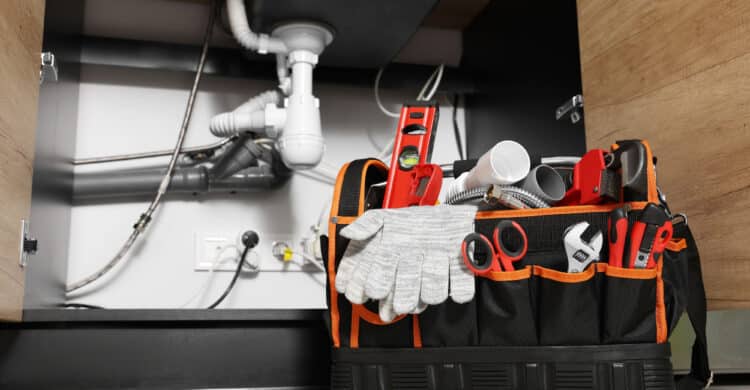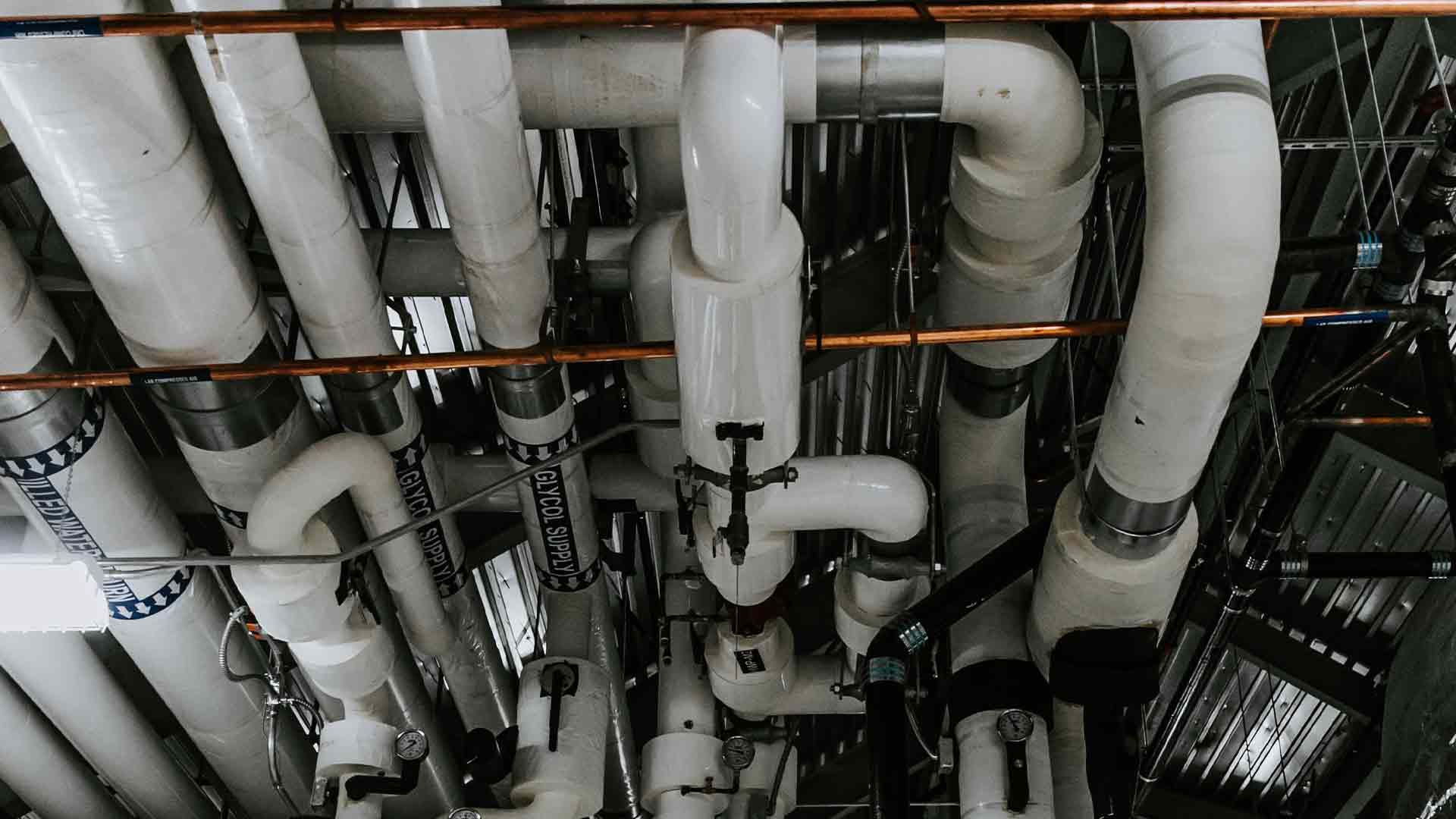
The Importance of Regular Plumbing Maintenance and Inspections
But what if we told you that you didn’t have to wait for a problem to erupt? What if there was a way to identify plumbing system problems before they made a mess of your flooring, ceiling, walls, etc. – and fix them beforehand for cheaper than after they erupt?
Well, there is a way to do just that – and it’s through routine plumbing inspection and regular plumbing maintenance.
What is a Plumbing Inspection?
A plumbing inspection — followed by regular maintenance — allows a trained professional to see every part of your plumbing. This not only tells you of any problems you may have – but also identifies any potential plumbing issues that could happen in the future.
During a plumbing inspection, an experienced professional will utilize both knowledge and special tools to examine every aspect of how water flows through your property, including via:
- Indoor and outdoor pipes (including supply lines and sewage lines)
- Hose bibs, both outdoors and in the laundry room
- Sinks(including garbage disposals) and bathtubs
- Faucets and showers
- Toilets
- Water heaters
- Well pumps
Why are Plumbing Inspections so Important?
If you’ve ever had a burst pipe or leak that goes unnoticed for some time, you understand the importance of knowing what’s going on with your plumbing. All plumbing problems seem to happen at the worst time and are never easy to fix. The benefits of Home plumbing inspections can help you avoid these concerns – or at least correct them within your time frame and avoid costly repairs.
Plumbing inspections (and any necessary repairs) are also critical for someone considering purchasing a property (home or business). You should know that basic home inspections do not comprehensively examine plumbing systems like a true plumbing inspection.
In fact, typical home inspections only really check to see that drains are empty, toilets flush, and taps work.
For this reason, plumbing inspections can also be a great tool for someone looking to sell a home or property, so that you do not get blindsided should a potential buyer find a problem and walk away from the sale.
Early Problem Detection
By utilizing tools such as pipe inspection cameras (which are attached to lines and can be snaked through every type of pipe, including sewage lines), a plumbing inspection can judge the condition of all pipes and note any potential cracks or weak spots in the line.
An inspection will also note the condition of all joins, valves, and junctions, as these can be weak points in an aging plumbing system.
Toilets and faucets also have shelf lives, and a plumber will be able to tell if they are getting near the end of their functional lifespan. The same goes for water heaters, which function for 8-12 years, before failing. And when they do fail, it can lead to a flooded basement or crawlspace.
Well pumps last much longer (15-25 years), but it’s good to know the condition of your pump and know how it is performing
Of course an inspection is just the first step, and it must be followed by preventative maintenance to make the most of this aspect of plumbing.
Prevention of Costly Water Damage
When it comes to plumbing, prevention is almost always a less expensive alternative to emergency repair. That is because you can schedule preventative maintenance at your convenience. Conversely, when an emergency happens it may be off normal business hours – when plumbers rates can increase.
Also, an inspection allows you to avoid any damage that a burst pipe or broken water heater (for example) can yield. An inspection removes chance from the equation and allows you to make any repairs without fear of water gushing out onto sensitive surfaces. Even the smallest, undetected leak can do immense damage to walls, flooring, or ceilings – either by contributing to mold and mildew growth or even weakening the structures themselves. These outcomes only increase your costs for emergency repair.
Improved Energy Efficiency
By inspecting your entire plumbing system, a plumber can show you where you might be losing water or water pressure – either through slow leaks, dripping faucets, running toilets, or small clogs. Any of those problems can cause your water system to work harder and deny you full efficiency.
It can also yield power waste, especially when it comes to appliances such as your hot water heater, dishwasher, washing machine, etc. That is why increased energy efficiency is improved by regular plumbing inspections.
Extended Lifespan of Plumbing Components
By ensuring that your plumbing is running at the right pressure, you ensure that your faucets, toilets, pipes – frankly every aspect of your plumbing – will last as long as possible. All plumbing is designed to work at specific water pressures, and if it is under increased pressure, you can expect it to fail at an early stage.
An inspection will determine if the water pressure in your home or office meets the correct standards.
Plumbing inspections also help extend the life of components such as faucets and garbage disposals, as well as large appliances, such as dishwashers.
Preserving Water Quality
A plumbing inspection will also help determine the quality of water flowing through your plumbing and determine if there are concerns with the water that must be addressed – as well as offer solutions to any concerns.
The water in your home is key to your health – think about the amount of water that you drink and wash with on a daily basis. If there are any problems with that water, you risk damaging your health by being in so much contact with it.
If you have any fears over your water quality, a full inspection will give you detailed information on the state of your water.
Peace of Mind
Whether it’s your physical health or your financial bottom line, a plumbing inspection can do much to inform you and ensure that there are no surprises in store. That goes for the quality of all of your plumbing components, as well as the quality of the water you use.
An inspection can also help you avoid paying exorbitant emergency repair fees, as well as help you avoid damage to your home or office. Isn’t knowing all of that the very definition of peace of mind?
What to Expect During a Plumbing Maintenance Service
When you schedule a plumbing inspection or maintenance service, you can and should expect a few things:
- That the plumber arrives on time and treats you and your property with respect.
- Have an in-depth knowledge of all aspects of plumbing.
- Have all of the tools necessary to perform a thorough inspection.
You can also expect a thorough inspection to take some time, as the plumber must thoroughly examine the entirety of your plumbing system. As stated previously, the plumber must check all of these aspects during regular inspections:
- Indoor and outdoor pipes (including supply lines and sewage lines)
- Hose bibs, both outdoors and in the laundry room
- Sinks (including garbage disposals) and bathtubs
- Faucets and showers
- Toilets
- Water heaters
- Well pumps
When a professional plumber checks your faucet, they will not only look for leaks and drips but also signs that it retains a full range of motion and is not showing any signs of wear.
Drains
Plumbers will check all the drains inside and out for signs of pooling and/or clogs during regular house plumbing inspections. They will also look for signs of water damage around the sink, outdoor area, or basement where they are located (or located nearby) to ensure that water is flowing correctly through the drain and there are no cracks or blockages.
Toilets
It may seem obvious, but, during inspection, plumbers will look for more than just blockages with your toilets. They will also inspect the guts of the toilet, as well as its supply line and connection with the floor. They will also listen for odd noises and ensure that it does not run longer than is necessary.
Water Heater
Your water heater offers several signs that it may be reading the end of its life cycle, and your plumber will check every aspect of your water heater while conducting an inspection. It starts with age – don’t worry if you don’t know when it was installed; a plumber will be able to tell the exact age of the unit by the serial numbers on the unit.
They will also check for rust deposits and ask about water temperatures and taste and smell.
Pipes
During a plumbing inspection, a plumber will first check your system for water pressure concerns and then begin to visually inspect all easy-to-see pipes for signs of leaks, dripping, rust, smell, and more. They will then use a pipe inspection camera to get a look at all the pipes they cannot see with ease. That includes pipes inside walls, ceilings, floors, and underground in your yard – as well as all sewage pipes.
Garbage Disposal
During inspection, plumbers will check your disposal’s state by looking at the impeller blades and other aspects of the disposal – as well as its connections with your sink and drain.
How Often Should Plumbing Be Inspected?
Most plumbing professionals suggest that you have a complete home plumbing inspection every two years. However, if your home is older than 40 years, it may be wise to increase your inspection routine to once a year. Older homes are notorious for plumbing problems. Many of them lay hidden – especially those underground and next to the foundation (thanks to the growth of roots and ground settling) – and can get worse with each passing year. Routine plumbing maintenance should also be something you budget money for — on top of routine plumbing inspections.
Contact Us Today
Now that you see the importance of plumbing inspections as part of routine home maintenance, know that Conditioned Air Systems is here to give you a full and detailed understanding of your plumbing situation – no matter your home’s age. We now offer the same full range of expertise, customer service, and flexibility that you have come to expect from Conditioned Air’s HVAC services. That includes regular plumbing maintenance and inspection of any type of plumbing system.
You can expect Conditioned Air plumbers to:
- Arrive on time
- Give you a fixed price with no hidden surprises
- Be friendly and professional
If unsure of your plumbing condition or suspect you need routine maintenance, please contact us right away at 770-536-7509 and let us provide the peace of mind that comes with a total understanding of your situation.

